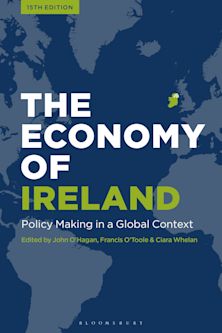A Radical Bargain for Europe
Progressive Visions of a European Basic Income
A Radical Bargain for Europe
Progressive Visions of a European Basic Income
This product is usually dispatched within 2-4 weeks
- Delivery and returns info
-
Flat rate of $10.00 for shipping anywhere in Australia
Description
During the last two decades, the European Union has come under increasing existential threat. Successive historic crises have called into question the EU’s ability to meet the needs of its citizens, and effectively navigate the emerging challenges of the 21st century. From sovereign debt, Mediterranean migration, and Brexit to climate change, the Covid-19 pandemic, and spiralling conflicts just beyond its borders, the EU has struggled to carve out a meaningful path forward. Worse, through action or inaction, it has often failed to live up to the lofty ideals of its foundation. In response, the EU has faced a growing tide of Europhobic dissent, driven by insurgent populism and nationalism.
Left unanswered, this tide promises to overwhelm the EU and irretrievably damage the legitimacy of its institutions—or see them coopted into the chauvinist projects of a new and emboldened ‘authoritarian international’. In light of this, progressive forces who value the positive role the EU can play in the world face a stark and urgent choice. They can give the EU a new fundamental vision, centred on elevating the situation of the worst-off in all corners of European society. Or they must reconcile themselves to losing it permanently as a force for freedom and equality, justice, solidarity, and pluralism across the European continent and beyond.
A Radical Bargain for Europe makes an impassioned case for the first of these two choices. It argues that social policy is the site where this new vision must be developed, as the live frontier of the latest debates over the course of European integration. And it presents the concept of a basic income as a concrete step towards fulfilling the promise of a ‘social Europe’—folding in one of the greatest questions of modern social policy debates in many national contexts. This book presents an outline of what a European basic income (EUBI) would look like. It argues that, in its fundamental form, an EUBI has its attractions to a wide range of progressive ideologies, from the far left, greens, and social democracy to liberalism and Christian democracy. Each of these ideologies adds its own unique colour to the shape an EUBI could take, in principle and in practice. Yet all of them must work together in a broad ‘agenda coalition’ to take the next step towards European social integration, embrace an EUBI, and realise the EU’s radical potential.
Product details
| Published | 02 Jul 2024 |
|---|---|
| Format | Hardback |
| Edition | 1st |
| Extent | 230 |
| ISBN | 9781538167922 |
| Imprint | Rowman & Littlefield |
| Illustrations | 1 Table, 3 Graphs |
| Dimensions | 236 x 160 mm |
| Publisher | Bloomsbury Publishing |
Reviews

ONLINE RESOURCES
Bloomsbury Collections
This book is available on Bloomsbury Collections where your library has access.


































